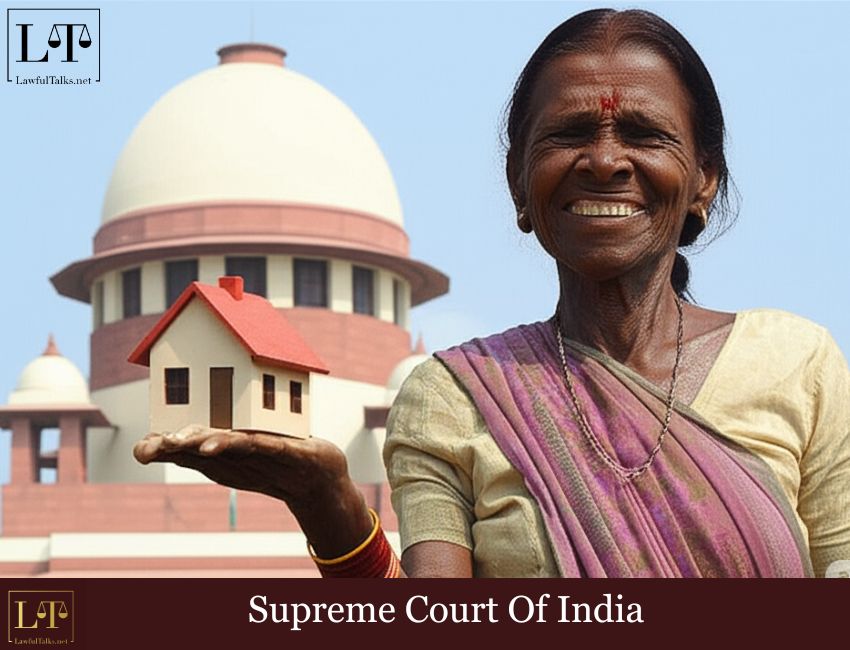Allahabad HC Sets Aside Afzal Ansari's Conviction, Allows Him to Continue as MP

In a landmark judgment upholding gender equality, the Supreme Court determined that, “there is no rationale in allowing inheritance only to the male heirs,” Additionally, denying succession rights to female members of a tribal community—without any established custom barring such inheritance is unconstitutional, they remarked. This ruling thereby rejects and seals the fate of any gender-based exclusion from ancestral property.

While examining the applicability of succession laws to Scheduled Tribes, the Court acknowledged that the Hindu Succession Act does not extend to tribal communities. However, the absence of this statutory framework does not automatically negate the rights of tribal women to inherit ancestral property, the Court emphasized.
The key question for determination, according to the Bench, is whether there exists a specific custom or practice within the community that explicitly prohibits women from inheriting property.
In this particular dispute, no such custom excluding women could be demonstrated by the opposing party, the Court noted. Even hypothetically assuming that such a custom might exist, the Court observed that customary practices too must evolve with time.
“Customs too, like the law, cannot remain stuck in time and others cannot be allowed to take refuge in customs or hide behind them to deprive others of their right.”underscored the judgment.
Facts:
The Bench, comprising Justices Sanjay Karol and Joymalya Bagchi, was adjudicating an appeal filed by the legal heirs of a Scheduled Tribe woman named Dhaiya, who sought her rightful share in her maternal grandfather’s property. Male members of the extended family had opposed this claim, arguing that their community’s customs did not recognize succession through female members.
The lower courts—including the trial court, and the High Court—had all dismissed the women’s claims, reasoning that they failed to prove the existence of a custom permitting inheritance through female lines. However, the Supreme Court took a sharply different view, stating that in the absence of a prohibitive custom, equality must prevail.
The judgment authored by Justice Karol held that the burden of proof should not lie with the claimants to establish a custom allowing female inheritance, but rather, the opposing side should be required to prove any restrictive custom that excludes women.
It stated,“Granted that no such custom of female succession could be established by the appellant-plaintiffs, but nonetheless it is also equally true that a custom to the contrary also could not be shown in the slightest, much less proved. That being the case, denying Dhaiya (tribal female) her share in her father's property, when the custom is silent, would violate her right to equality vis-à-vis her brothers or those of her legal heirs vis-à-vis their cousin.”
By denying succession to a female tribal member solely due to lack of a permissive custom, the lower courts had effectively endorsed gender-based discrimination, the Supreme Court observed.
Such denial, the Court held, was a clear violation of Article 14 of the Constitution, which ensures equality before the law.
Reinforcing this reasoning, the Bench also invoked Article 15(1), which prohibits discrimination by the State on the grounds of sex, religion, race, caste, or place of birth.
The judgment also cited Articles 38 and 46, reflecting the Constitution’s commitment to promoting social justice and eliminating inequality, especially in the case of historically marginalized groups such as women and tribal communities.
The Court stated: “There appears to be no rational nexus or reasonable classification for only males to be granted succession over the property of their forebears and not women, more so in the case where no prohibition to such effect can be shown to be prevalent as per law. Article 15(1) states that the State shall not discriminate against any person on grounds of religion, race, caste, sex or place of birth. This, along with Articles 38 and 46, points to the collective ethos of the Constitution in ensuring that there is no discrimination against women.”
Ultimately, the Supreme Court allowed the appeal and granted Dhaiya’s legal heirs an equal share in the property, reinforcing the constitutional guarantee of gender equality in matters of succession where no codified or customary bar exists.
Cause Title: Ram Charan & Ors. vs. Sukhram & Ors.
Appearance
For the Petitioners: Mr. Padmesh Mishra, Ms. Vastvikta Bhardwaj, Mr. Nikunj Goyal, Mr. Aditya, Mr. Vijant, Ms. Neelam Singh (AOR)
For the Respondents: Mr. Bipin Bihari Singh, Mr. Ashok Anand (AOR), Mr. Anand Kumar Singh, Mr. Ajay Gupta, Mr. Mukul Dev Mishra, Mr. Sumeer Sodhi (AOR)
Leave a Comment

Shalini Chavan
Advocate, Bombay High Court
Latest Posts
Categories
- International News 19 Posts
- Supreme Court 327 Posts
- High Courts 340 Posts









































































































































































































































































































































































































































































































































































































































































































